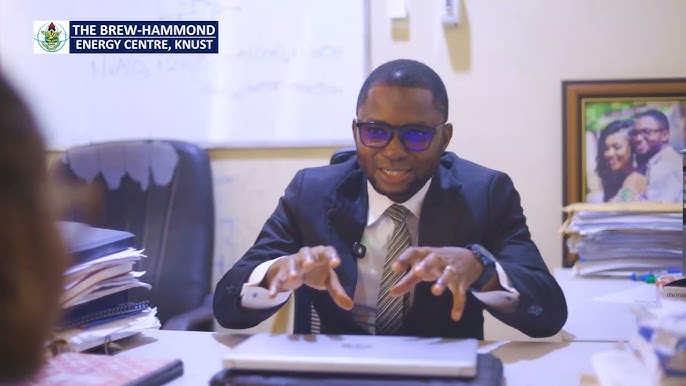Ghana has been urged to take bold steps in developing green hydrogen production and storage systems as part of a broader strategy to secure a clean and sustainable energy future.
Dr. Patrick Boakye, Group Chair of the newly formed Green Hydrogen and Energy Storage Group at the Brew-Hammond Energy Centre, underscored the vast potential green hydrogen holds for decarbonizing key sectors and transforming Ghana’s energy landscape.
“There is the need for green hydrogen because of the benefits it brings. It burns clean, it gives out a lot of efficiency.”
Dr. Patrick Boakye, Group Chair of the newly formed Green Hydrogen and Energy Storage Group at the Brew-Hammond Energy Centre
Dr. Boakye highlighted Ghana’s unique positioning to take advantage of renewable resources—especially agricultural by-products like cocoa pods, corn husks, and coconut husks—as feedstock for green hydrogen production.
These residues, often considered waste, could become a critical input in Ghana’s transition to a low-carbon economy.
“We can use [these residues] to produce hydrogen, and it becomes the parent material for production of the commodity material for ammonia.
“Hydrogen can also be used as fuel material for transportation or even in aviation.”
Dr. Patrick Boakye, Group Chair of the newly formed Green Hydrogen and Energy Storage Group at the Brew-Hammond Energy Centre

His comments echo global trends where green hydrogen is being explored as a clean alternative fuel in heavy transport and industrial sectors.
However, one of the main hurdles is the high capital cost associated with the technology, particularly proton exchange membrane (PEM) electrolysis used in splitting water molecules to extract hydrogen.
“The issue is capital cost. It is huge to invest in it.
“Particularly the proton exchange membrane electrolysis to split hydrogen and water.”
Dr. Patrick Boakye, Group Chair of the newly formed Green Hydrogen and Energy Storage Group at the Brew-Hammond Energy Centre
To address this cost barrier, Dr. Boakye proposed turning to more accessible technologies such as gasification.
“We need to develop infrastructure to convert materials into energy. Gasification can be adopted, and it can be combusted for hydrogen and purified.
“This can be the alternative. Regardless of the challenges, there are other alternatives that can be done.”
Dr. Patrick Boakye, Group Chair of the newly formed Green Hydrogen and Energy Storage Group at the Brew-Hammond Energy Centre
Such pragmatic approaches could lower the entry barrier for developing countries like Ghana to participate in the global hydrogen economy.
Cleaner Climate Future

Beyond energy production, green hydrogen has major implications for environmental protection.
“Our climate will be safe if these carbon emissions are reduced.
“This can help in decarbonizing the heavy carbon-producing industry because hydrogen gives clean burning.”
Dr. Patrick Boakye, Group Chair of the newly formed Green Hydrogen and Energy Storage Group at the Brew-Hammond Energy Centre
Currently, much of the energy used in heavy industries and transport relies on fossil fuels, leading to high emissions.
Green hydrogen could become a key enabler in Ghana’s efforts to meet its climate commitments under the Paris Agreement.
Dr. Boakye revealed that the Green Hydrogen and Energy Storage Group is actively conducting feasibility studies to evaluate the most viable local production methods.
“We’re doing a feasibility study on green hydrogen production methods that we can use to produce hydrogen.
“Our focus is on looking at local ways of producing hydrogen.”
Dr. Patrick Boakye, Group Chair of the newly formed Green Hydrogen and Energy Storage Group at the Brew-Hammond Energy Centre
The team’s emphasis is not only on production but also on storage and distribution—essential components of a functioning green hydrogen value chain.
While the research community is ready to step up, Dr. Boakye made a strong appeal for deliberate policy support and investment. He noted that Ghana’s energy future cannot rely solely on conventional fuels.
“The world now thrives on materials, energy, and the environment.
“You are better off if you are thinking about the fifth industrial revolution of AI, etc. Then there is the need for alternative energy solutions.”
Dr. Patrick Boakye, Group Chair of the newly formed Green Hydrogen and Energy Storage Group at the Brew-Hammond Energy Centre
As global interest in green hydrogen surges—particularly in regions like Europe and Asia—Ghana stands to benefit from early investment in domestic research, infrastructure, and private sector partnerships.
With ongoing feasibility studies, increased awareness, and collaboration between government agencies, academia, and private investors, Ghana’s green hydrogen industry has the potential to flourish, driving the country toward energy security and sustainability.
READ ALSO: Wencai Zhang Calls on Finance Minister, Pledges Stronger World Bank-Ghana Partnership























